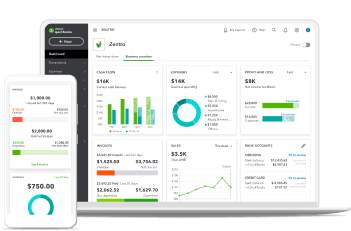A recession can be defined as a sustained period of weak or negative growth in real gross domestic product (GDP) that is accompanied by a significant rise in the unemployment rate. This ultimately results in an increase in the price of goods and services. In a recession, consumer spending drops, leading to a reduction in economic activity - buying and selling. The government may have to intervene through various measures - for example, to cut interest rates - to support the economy.
What does this mean for your firm and your clients' businesses? It's anyone's guess, but the number one thing you can do for your firm is put together a survival plan to make sure you can ride out this storm - and remain formidable when the skies clear.
Of course, you can take a deep look at your financial statement and make an in-depth analysis or evaluation of your financial position, but you should always start with the first line item on almost every performance or tax-related form we fill out: income. Let's look at some questions and topics, and several other factors you may not have thought of for this process.
Income sources
- Are we able to sustain the current income level?
- How can income be increased?
- Diversify your services by offering new services to current clients and expand your client base. Opt for services, such as payroll, that provide a recurring revenue profit stream. QuickBooks cloud payroll software offers auto payroll, which automatically processes payroll, pays the tax and files the return.
- Accounts payable/receivable: these services are easier to offer today with the availability of apps which easily capture bills, have an approval workflow, integrate with QuickBooks Online and have various payment options. Gone are the days of running a stack of cheques and waiting for the controller to sign them. When accountants offer this service, they help to maintain a healthy cash flow in their clients’ businesses. Healthy cash flow is the oxygen of any business, and our clients will love us for this!
- Consulting services: simply put, you need to offer advisory services. A good one would be to help our clients design efficient workflows and use apps in every possible area of their business. This would eliminate redundancies to save time and reduce reliance on manual labour, especially when it's hard to find good employees. Other advice you can offer, for example, is to help your clients become a paperless (or less paper) business. Our work as accountants would be much easier if our clients embrace technology to work more efficiently and save time.
- Referrals: our clients are the cheapest advertisement we have. Ask them for quality leads and be sure to thank them, even if the lead does not become a sale.
Pricing
Considering the increasing cost of goods and services, this is a good time to review and evaluate your pricing and price model. Do you need to adjust or create a hybrid price model? You may employ hourly, fixed value-based pricing, or a combination depending on the engagement.
Budgets
Prepare a budget for the firm, stick to it, and allow flexibility for only absolutely necessary changes. Budgets can truly help us stay on track and indicate the degree of any variation. They should be guides to help get us back on track. It is easier to be on track when we can measure the deviation from projected/expected results.

















